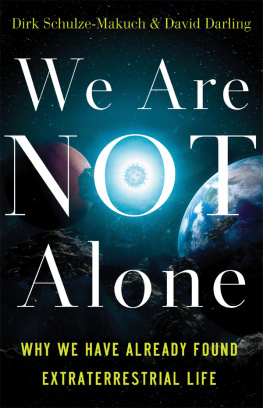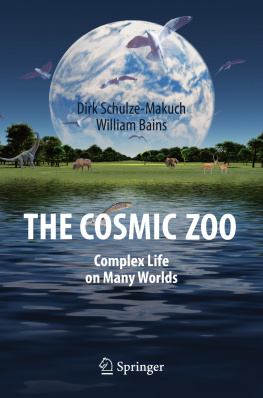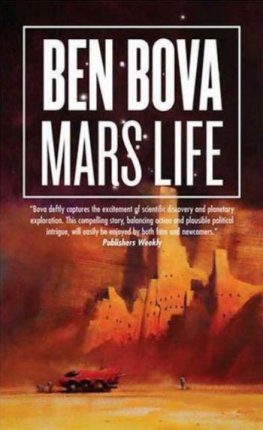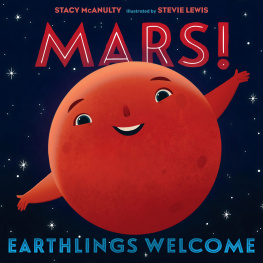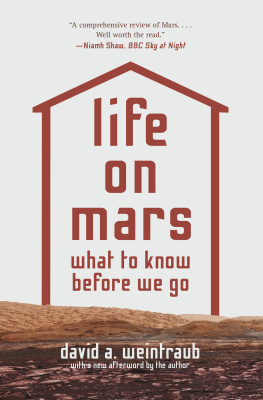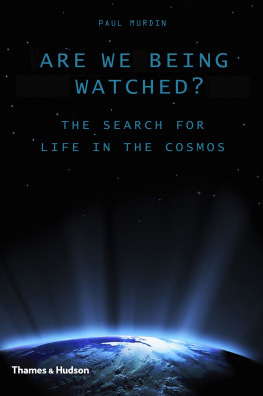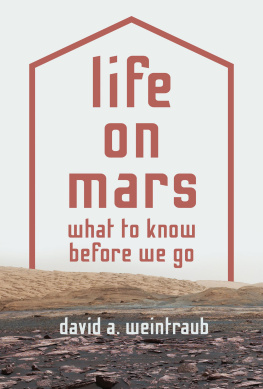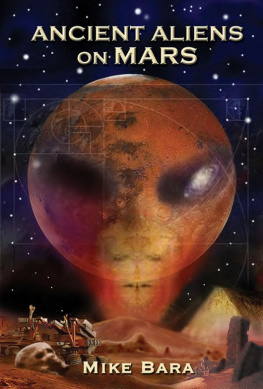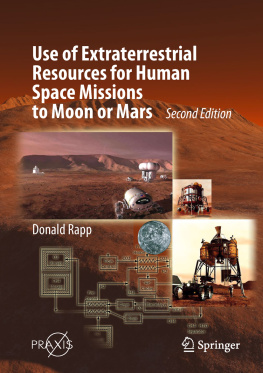We Are Not Alone
A compelling landmark book that will take you on an exhilarating ride.
Daily Express
Packed with facts and written in an absorbing style, this book leaves you in no doubt that extraterrestrial microbes could yet be found in our Solar System.
BBC Sky at Night
An exhilarating ride. The arguments advanced for the prevalence of life in the Solar System are well developed and highly stimulating.
Times Higher Educational Supplement
A highly recommended case that brings the new possibility to readers of life at various levels. Conditions which are probably too hostile to permit life to exist - certainly life as we know it...Compelling. The search for extraterrestrial life has entered the scientific mainstream. Balanced and thoughtful.
Neil F. Comins Professor of Physics at the University of Maine and author of The Hazards of Space Travel
Well written, concise, and elegant. I was barely able to put it down.
Felisa Wolfe-Simon Research Fellow, Department of Earth and Planetary Sciences, Harvard University
Bang up to date and utterly riveting. An absorbing account of one of the greatest unresolved debates in the search for life.
Lewis Dartnell author of Life in the Universe: A Beginners Guide
Interesting, accessible, and refreshingly upbeat.
Seth Shostak Senior Astronomer at the SETI Institute and author of Confessions of an Alien Hunter: A ScientistsSearch for Extraterrestrial Intelligence
We Are Not Alone
Why We have Already Found Extraterrestrial Life
Dirk Schulze-Makuch and
David Darling

A Oneworld Book
First published by Oneworld Publications 2010
Reprinted 2010
This ebook edition published by Oneworld Publications 2011
Copyright Dirk Schulze-Makuch and David Darling 2010
The moral right of Dirk Schulze-Makuch and David Darling to be identified as the Authors of this work has been asserted by them in accordance with the Copyright, Designs and Patents Act 1988
All rights reserved
Copyright under Berne Convention
A CIP record for this title is available
from the British Library
ISBN 9781851688814
Typeset by Jayvee, Trivandrum, India
Cover design by DogEared Design
Oneworld Publications
185 Banbury Road
Oxford OX2 7AR
England
Learn more about Oneworld. Join our mailing list to find out about our latest titles and special offers at:
www.oneworld-publications.com
Preface
S ince the time of ancient Greece and perhaps well before that, mankind has dreamed of alien worlds and the beings who might inhabit them. But this long period of speculation may be about to end.
In this book we shall argue that theres powerful evidence to suggest were not alone in the universe and, in fact, that we have company close at hand, within the Solar System. Data collected over the past three decades indicate that one of our neighbouring worlds almost certainly harbours life and several others may do so. That is the central, controversial claim of this book. We may be on the brink of finally proving that extraterrestrial biology exists right here, in our cosmic midst.
The authors come from quite different backgrounds but share a common belief: that the signatures of life beyond Earth have already been detected. Dirk Schulze-Makuch, of Washington State University, has been at the forefront in recent years of scientific debate about life on Mars, Venus, and Titan. His explanations of spacecraft data in terms of extraterrestrial biology have attracted worldwide media attention. He is also involved with planning for future space missions. Author and astronomer David Darling has written extensively about the new science of astrobiology.
Acknowledgements
T he authors are grateful to the following colleagues for their helpful conversations, correspondence, suggestions, and source material: Sam Abbas, Dale Andersen, Vic Baker, Penny Boston, Athena Coustenis, Alfonso Davila, Detlef Decker, Ben Diaz, James Dohm, Thomas Eisner, Alberto Fairn, Chaojun Fan, Wolfgang Fink, Roberto Furfaro, David Grinspoon, Huade Guan, Ed Guinan, Victor Gusev, Shirin Haque, Joop Houtkooper, Louis N. Irwin, Mohammed Islam, Gil Levin, Darlene Lim, Jere Lipps, Giles Marion, Chris McKay, David McKay, Anthony Muller, Dorothy Oehler, Marina Resendes de Sousa Antnio, Ed Sittler, Bob Shapiro, Carol Turse, Corby Waste, and Jacek Wierzchos.
We also thank our editor Mike Harpley for his numerous constructive criticisms and tireless efforts to move the book forward.
Finally, and mostly importantly, we are grateful to our families for their support and patience over the two years this book went from first thoughts to finished manuscript.
Illustrations
Chronology of the Quest for Alien Life
| Lucian of Samosata writes his True History, in which extraterrestrial life is talked about (whimsically) in detail for the first time. |
c.1450 | Nicholas of Cusa revives the ancient idea that planets might be inhabited. |
1650 | Christiaan Huygens observes Syrtis Major, the first permanent feature observed on another planet (Mars). |
1859 | Charles Darwin publishes The Origin of Species. |
1862 | French astronomer Emmanuel Liais suggests that dark areas on Mars might be vegetation. |
1877 | Italian astronomer Giovanni Schiaparelli reports seeing what he calls canali (channels) on Mars. |
1893 | British biologist James Reynolds suggests that life could be based on silicon. |
1894 | Percival Lowell founds his observatory in Arizona and publishes his first book, Mars. |
1897 | H. G. Wells publishes War of the Worlds. |
1918 | Swedish chemist Svante Arrhenius publishes his ideas about life on Venus. |
1929 | British geneticist J. B. S. Haldane speculates about the chemical origin of life. |
1932 | Carbon dioxide found in the atmosphere of Venus. |
1937 | Dutch-American astronomer Peter van der Kamp begins the search for extrasolar planets. |
1943 | Dutch-born American astronomer Gerard Kuiper discovers the atmosphere on Titan. |
1953 | Stanley Miller and Harold Urey carry out their famous origin-of-life experiment. |
1954 | J. B. S. Haldane suggests the possibility of ammonia-based life. |
1958 | Panel on Extraterrestrial Life, formed to discuss the problem of what extraterrestrial life might be like and how to look for it. |
1959 | First grant awarded by NASA, to Wolf Vishniac, to develop a prototype alien life detector. |
1960 | NASA begins planning to send a spacecraft to search for life on Mars. |
1962 | Mariner 2 flies past Venus. |
1965 | Mariner 4 flies past Mars. |
|
Next page
